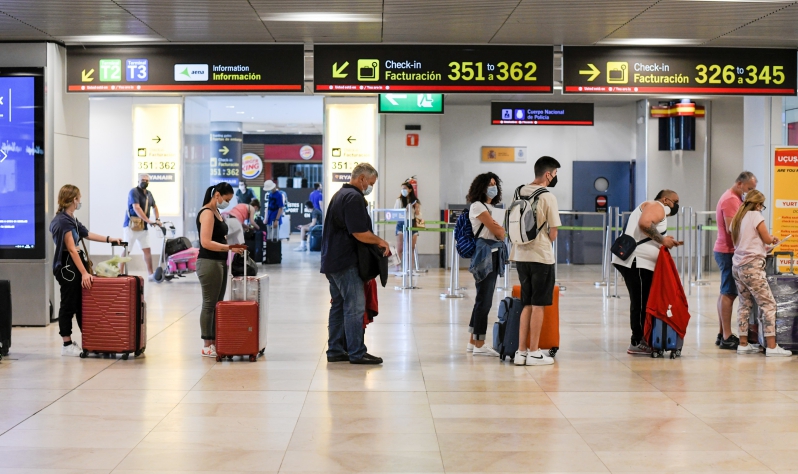
Audit report shows that, despite mandates and state financial support, EU airlines often failed to reimburse passengers.
In 2019, over a billion passengers boarded flights in the European Union, generating revenues of €120 billion for Europe’s air carriers. But COVID-19 wreaked havoc on the airline industry. As worldwide travel came to a halt, Europe’s airlines lost an estimated 800 million passengers and saw their revenue tumble to only €37 billion.
To prevent widespread bankruptcies, national governments stepped in, disbursing over €30 billion in state aid to airlines and another €500 million to airports. But despite this significant support, the industry failed to follow through on its legal obligations to protect passenger rights, according to a recent report from the European Court of Auditors (ECA), the EU’s independent auditor.
The EU has some of the strongest passenger protection rights in the world, with regulations that entitle passengers to refunds and other assistance when flights are suspended and tickets cancelled. Following the widespread travel disruptions caused by COVID-19, however, the ECA found that many airlines failed to follow these rules—and that both the European Commission and national governments failed to enforce them adequately during the pandemic.
If an airline cancels a flight in the EU, it is permitted to offer vouchers for the ticket’s value, but passengers are also entitled to opt for a cash refund within seven days if they desire one. Passengers who choose not to fly—even due to sickness or to heed quarantines, stay-at-home orders, or similar measures—are not protected by these regulations. Refunds and ticket exchanges to those passengers, if available, occur in accordance with the conditions imposed by the airline or, if they elected to purchase one, their travel insurance policy.
Many European airlines failed to comply with the passenger protection regulations. The ECA noted that airlines slowly began to issue cash refunds for cancelled flights, as required by law, only months after the beginning of the pandemic.
One significant issue, the ECA argued, is the public’s lack of knowledge about their rights. Only 49 percent of European air travelers know that passengers have rights, even though airlines are obligated to inform them. Although the Commission increased its public outreach efforts during the pandemic, the ECA judged the campaign ineffective.
During normal conditions, a typical airline keeps a cash reserve of about two months on hand. The ECA estimated that airlines cancelled some 50 million tickets during the height of travel restrictions from March to May 2020, representing a value of about €9.2 billion due back to passengers.
As revenues plummeted, Europe’s airlines found themselves in an unprecedented liquidity crisis and faced the prospect of running out of money by May 2020. In response, 15 EU countries relieved their airlines from the obligation to provide cash refunds, allowing them instead to provide vouchers.
Another two countries, Italy and Greece, abrogated the entirety of the EU’s air passenger protections. These actions violated EU law, and the Commission initiated infringement proceedings against the Italian and Greek governments.
In the remaining countries, vouchers are not an acceptable alternative to cash, argues the ECA, because airlines often condition their redemption and limit their use to the issuing airline. In addition, consumers stand to lose those vouchers if an airline goes bankrupt—a real possibility during the pandemic.
Months after the pandemic began, airlines began to issue cash refunds. The ECA attributed this reversal to several causes, including the infusion of state aid and the Commission’s stance that, notwithstanding the actions of some national governments to suspend passenger rights regulations, the failure to provide refunds was illegal under European law.
During the pandemic, the Commission rolled out state-aid rules to govern the use of public cash to support airlines. State aid took a number of forms, including loans and grants. Although the Commission encouraged national governments to condition their aid packages on airlines following through with their legal obligations to refund passengers, no country did so.
Most countries demonstrated no such aversion, however, to taking action to protect passengers from tour operators—firms that package holidays, a popular product in Europe. These tour operators also received significant aid, and the majority of that aid contained stipulations designed to preserve passenger rights.
The ECA attributed the difference in treatment between tour operators and airlines to regulations governing tour operators, which include provisions protecting consumers from operator bankruptcies. The European Parliament subsequently called for the Commission to consider extending similar bankruptcy protections to airline passengers.
The ECA explained that, although the Commission urged national governments to safeguard passenger rights, its role was constrained. Although European passenger protections are set at the EU level, enforcement of these rules is left to national governments.
The refund issue is a vivid example of the Commission’s limited power. Although the Commission emphasized the fact that passengers could opt for a cash refund if they so desired, the Commission recommended that airlines offer vouchers that included protections in case of bankruptcy and other consumer-friendly measures. Although well-intentioned, the Commission’s recommendations were non-binding, and the ECA found that they had no significant effect and that airlines continued to disburse only vouchers for several months.
The ECA had earlier highlighted this issue in 2018, arguing then that the structure of regulatory authority leads to inconsistent enforcement of air passenger rights. The audit agency explained that the Commission can only monitor national efforts to protect passenger rights; it has no authority to take direct action.
In 2013, EU officials proposed to enhance the Commission’s enforcement powers, but that plan languished. The Commission has indicated that it will revisit the idea, accepting the ECA’s recommendation in its 2021 audit that the Commission work to improve enforcement of passenger rights, including by expanding the legal authority for the Commission and for national governments where necessary.
The ECA also urged the Commission and national governments to close the information gap on passenger rights to ensure that travelers are fully aware of the protections that apply to them. In addition, the ECA encouraged the Commission to improve its coordination of future state aid packages and to push member states to condition their aid on airlines guaranteeing the ongoing protection of passenger rights.
Although the ECA’s recommendations are non-binding, the European Commission has agreed in principle with all the audit agency’s suggestions. It remains to be seen, however, whether the Commission can muster the political will required to make the necessary regulatory changes to improve its enforcement mechanisms.



